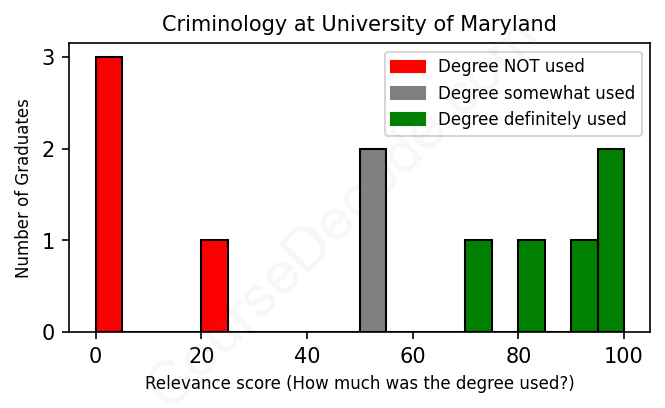
First, some facts. Of the Criminology graduates from University of Maryland we've analyzed , here's how many have used (or NOT used) their degree in their career:

These are estimates based on AI analysis of 11 LinkedIn profiles (see below).
The verdict? Significantly below average. Overall, with an average relevance score of 51%, Criminology graduates from University of Maryland have a much lower likelihood (-16%) of finding work in this field compared to the average graduate across all fields:
And for comparison, here's the chart for all profiles we've looked at across all degrees.
Also, after graduating, 36% of these graduates have pursued further education other than another Bachelor's degree (such as a Masters degree or other), compared to the average across all profiles of 35%. This suggests you may need more than just a Bachelors degree to be competitive as a Criminology graduate.
See the details:
|
Relevance score: 93% We think this person has gone into a career highly relevant to their degree. We think this person has gone into a career highly relevant to their degree.
DEGREE INFOGraduated in 2017 from University of Maryland with a Bachelor of Arts - BA in Criminology. No other secondary education since. JOB HISTORY SINCE GRADUATIONTechnical Assistant JBS International, Inc. May 2017 - Oct 2017 Relief Bailiff  Seattle Municipal Court Feb 2018 - Sep 2019 Bailiff  Seattle Municipal Court Sep 2019 - Present ABOUTNo information provided. |
The top 10 most common jobs done by the graduates we've analyzed (ranked most common to least) are:
When looking at the job paths of individuals who studied Criminology at the University of Maryland, it’s clear that there’s a mixed bag of careers. While some graduates have landed roles that are closely tied to the principles of criminology—like working as police officers, bailiffs, victim coordinators, and forensic interviewers—there are others who have ventured into fields like real estate, construction, or even aviation, which don’t have much to do with criminology at all. It seems that while some students land jobs directly related to their degree, a significant number end up in roles that require little to no criminological knowledge, focusing more on skills in areas like sales, project management, or general administration.
Overall, we can see a trend where specific careers, especially those in law enforcement and roles related to the court system, do align well with criminology studies. However, many individuals also find themselves in professions that, while potentially benefiting from a criminology background, do not directly use the skills or knowledge associated with the field. So, if you’re considering a Criminology degree, it’s good to keep an open mind about where it might take you—there are definitely relevant roles out there, but there are also plenty that might not seem particularly connected to your studies.
Here is a visual representation of the most common words in job titles for Criminology graduates (this is across all Criminology graduates we've analyzed, not just those who went to University of Maryland):

Based on the analysis of LinkedIn profiles of Criminology graduates from the University of Maryland, it seems that their career trajectories are quite diverse, with many finding paths that are either directly or indirectly related to Criminology. Interestingly, a good chunk of graduates tend to land roles in law enforcement or legal fields shortly after graduation. For instance, graduates serving as police officers, bailiffs, and even in specialized roles like victim advocacy highlight the relevance of their degree to the jobs they’ve taken on. It appears that many graduates are keen to enter public service or related fields, especially in positions that allow them to engage with criminal justice systems directly.
As we look at where these individuals are five to ten years post-graduation, there seems to be a mix of continued service in law enforcement and transitions into higher-level administrative roles or different sectors. Those who have remained in law enforcement often move up the ranks, taking on leadership roles or specialized positions like departmental heads or even joining the military with significant responsibility. Others pivot to government roles related to social advocacy, education, or community engagement, focusing on policy and program management. While some do venture into fields less connected to Criminology, such as real estate or administrative roles, the overall trend suggests many find fulfilling careers that align closely with their studies, making good use of their Criminology backgrounds in impactful ways.
Honestly, a Bachelor’s degree in Criminology at the University of Maryland can be a mixed bag in terms of difficulty, but I’d say it’s around average for a college degree. You’ll dive into some really interesting topics like criminal behavior, justice systems, and maybe even a bit of sociology and psychology. Expect a fair amount of reading and writing, plus a few tougher courses that might require some critical thinking and analysis. If you’re passionate about the subject, it can be super engaging, but if you’re just going through the motions, you might find it a bit more challenging. Overall, as long as you stay on top of your assignments and keep that curiosity alive, it shouldn’t be too overwhelming!
Most commonly, in the LinkedIn profiles we've looked at, it takes people 4 years to finish a Bachelor degree in Criminology.
So, looking at these Criminology grads from the University of Maryland, it’s a bit of a mixed bag when it comes to their earnings. The real estate broker and the naval aviator probably have decent salaries, especially with their specialties and experience; navy officers like the second grad tend to do pretty well with benefits and pay. The folks working for various organizations in education and advocacy seem to be more on the moderate end; while it's meaningful work, those positions often don’t come with huge paychecks. The recent grads, like those in law enforcement or administrative roles, are still climbing the ladder, so their incomes might be on the lower side for now. Overall, some of these graduates are definitely making good money, but others are probably just starting to find their financial footing in their careers.
Here is a visual representation of the most common words seen in the "about" section of LinkedIn profiles who have a Bachelor degree in Criminology (this is across all Criminology graduates we've analyzed, not just those who went to University of Maryland). This may or may not be useful:

Here are all colleges offering a Bachelor degree in Criminology (ordered by the average relevance score of their Criminology graduates, best to worst) where we have analyzed at least 10 of their graduates:
| College | Score | Count |
|---|---|---|
 California State University, Fresno California State University, Fresno
|
67 | 20 |
 George Mason University George Mason University
|
63 | 27 |
 Arizona State University Arizona State University
|
58 | 17 |
 Missouri State University Missouri State University
|
57 | 11 |
 The Ohio State University The Ohio State University
|
56 | 16 |
 Penn State University Penn State University
|
55 | 16 |
 Florida State University Florida State University
|
54 | 60 |
 West Virginia University West Virginia University
|
51 | 20 |
 University of Maryland University of Maryland
|
51 | 11 |
 John Jay College (CUNY) John Jay College (CUNY)
|
50 | 21 |
 University of South Florida University of South Florida
|
49 | 47 |
 Central Connecticut State University Central Connecticut State University
|
49 | 13 |
 University of Florida University of Florida
|
48 | 21 |
 The University of Texas at Dallas The University of Texas at Dallas
|
48 | 10 |
 Indiana University of Pennsylvania Indiana University of Pennsylvania
|
48 | 20 |
 Mississippi State University Mississippi State University
|
46 | 10 |